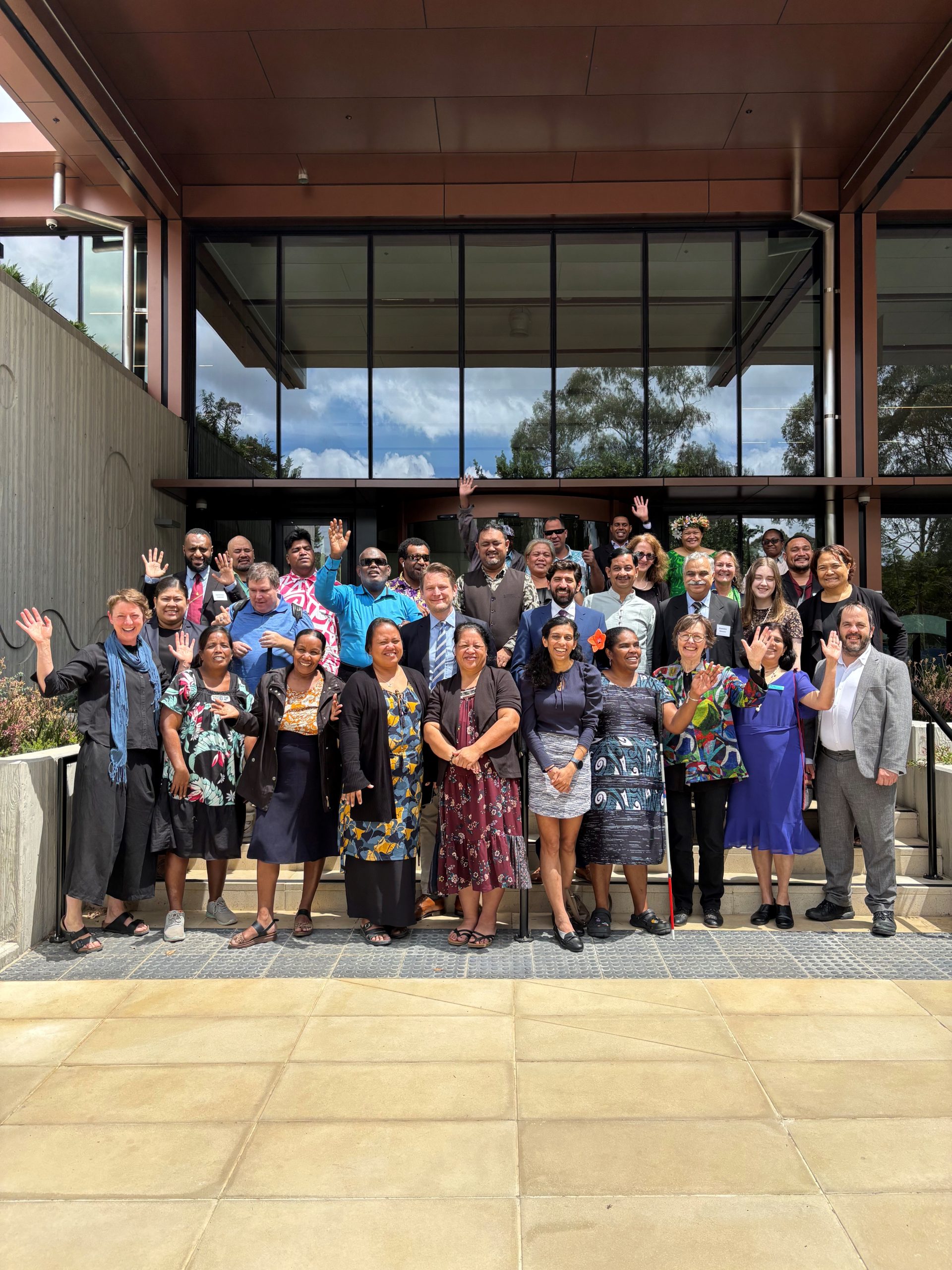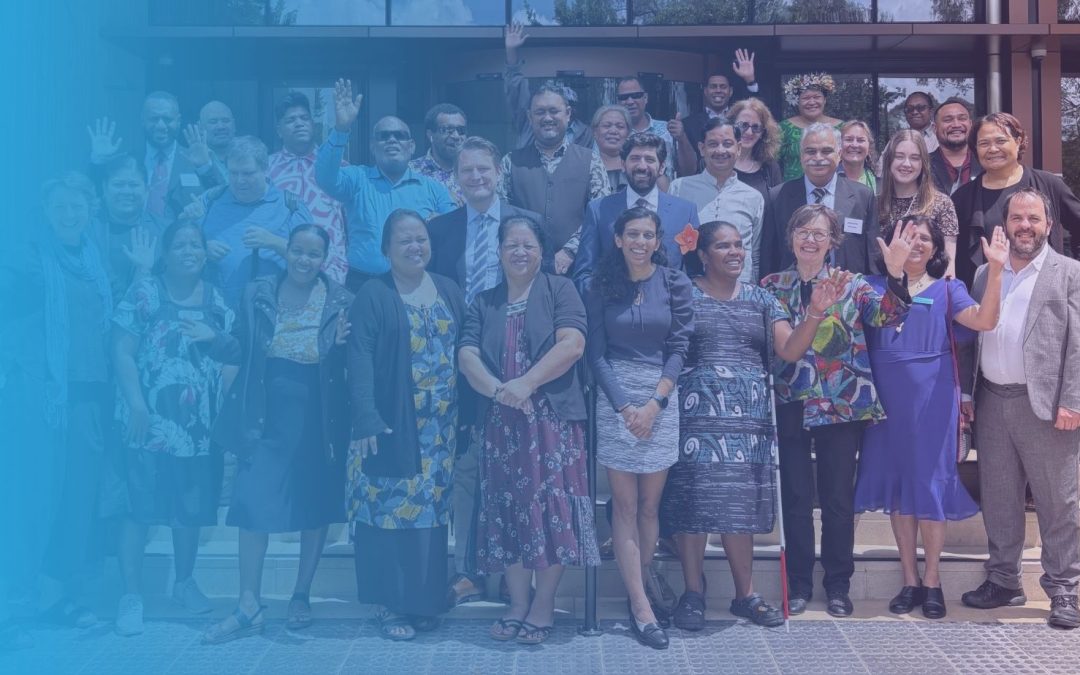By Julie Ganner AE
At the end of October, Agata Mrva-Montoya and I attended the Subregional “Right to Read” Conference for Pacific Island Countries, held in Sydney.
The conference was hosted by the World Intellectual Property Organization (WIPO), and supported through the WIPO Australia Funds-In-Trust (FIT) Program, with funding from the Australian Department of Foreign Affairs and Trade. It was attended in person and online by representatives of government and blindness associations from the Cook Islands, Fiji, Kiribati, Marshall Islands, Papua New Guinea, Samoa, Solomon Islands, Tonga and Vanuatu.
Throughout the conference, delegates noted the challenges to providing accessible reading materials that are faced by small, developing nations. The Cook Islands, for example, has a population of only 14,000 people scattered across 15 islands, and so does not have the economies of scale that would allow its government to purchase expensive equipment such as braille embossers. Meanwhile, 30% of its population is currently affected by vision impairment – a figure that is projected to rise to up to 50% in the next decade. This is due to both eye strain caused by overusing digital devices such as mobile phones and a rise in the incidence of diet-related diabetes and glaucoma.
Delegates also noted issues such as a lack of equipment and training, a scattered population, the scarcity of braille teachers, power outages caused by events such as hurricanes, unstable internet connectivity and the cost of data plans, which some non-government organisations cannot afford.
The first day of the conference addressed the main provisions of the Marrakesh Treaty. The main goal of the treaty, which is administered by WIPO, is to create a set of mandatory limitations and exceptions to copyright for the benefit of people with print disability. The presenters stressed the importance for nations of ratifying the treaty and transposing it into domestic law, so their citizens can benefit from its provisions. Delegates also discussed the lived experience of people with no or low vision in Pacific island countries.
The following day, Agata and I gave a presentation: “The role of publishers in producing accessible books”. Agata spoke about international initiatives, and the impact of the incoming European Accessibility Act. I focused on progress in Australia, using the work of the Institute of Professional Editors on accessibility to illustrate how elements of the industry can work together as a force for change.
WIPO’s program management officer, Mohammad Alhabbal, then spoke about the work of the Accessible Books Consortium (ABC). The ABC recently reached the milestone of hosting 1 million books in accessible formats. These are available to authorised entities – registered organisations for people with print disability located in countries that have ratified and implemented the Marrakesh Treaty – through the ABC’s Global Book Service.

Delegates from the Subregional “Right to Read” Conference for Pacific Island Countries, held in Sydney. Image: Supplied.
That afternoon, Sonali Marathe (Round Table on Information Access for People with Print Disabilities), Vithaye Vijaykumar (VisAbility) and Dipendra Manocha (DAISY Consortium) provided an introduction to accessible format production. The presenters discussed etext (such as EPUB 3), audio and braille – or, as Dipendra called it, “reading with eyes, ears and fingers”. They reminded us that digital files are not automatically accessible; they need to be correctly structured in order to be navigable by assistive technologies, contain descriptions of images, and be available in a choice of formats. If the source file is set up correctly, braille, etext and audio formats can all be produced directly from it. If not, the production of each format will require different conversion processes, which is time consuming and costly.
Presentations on the final day included a display of the impressive “ecosystem” of reading devices now available to people with print disability. These range from the very expensive, such as digital braille displays that cost US$400–500 and upwards, to small speakers into which a USB can be inserted to play an MP3 file, which can cost as little as US$4.
Dipendra Manocha demonstrated some of the audio systems available, including the DAISY player as well as a lower cost option: the Wine media player, a solar-powered audio player with open-source software that can convert documents into MP3 audio files. While some audio software reads in a digital voice, other options have a realistic “human” voice that can be customised for different languages and even accents (Australian or Indian English, for example).
Dipendra also discussed Dolphin EasyReader, a free app that can be used on smartphones or connected by Bluetooth to a refreshable braille display. It has both text and audio options, and the text is customisable for elements such as text size, margins, line spacing, letter spacing and colour.
The final presenter, Nigel Waring from Blind Low Vision NZ, then revealed an innovation developed by his organisation: smart speakers controlled by the user’s voice via apps such as through Amazon’s Alexa. Members can borrow books from the library and play them on the Amazon Dot, which costs NZ$35–70. Nigel reported that other specialist libraries are planning to explore the use of smart speakers. Blind Low Vision NZ is also in the process of connecting with the ABC global library, providing its members with a much larger range of accessible titles to choose from.
The response to the conference was extremely positive. Delegates reported that what they had learned about the Marrakesh Treaty, and the resources offered by WIPO to countries that ratify and implement it, had created an impetus for action.
The conference ended with the wonderful news that the Round Table on Information Access for People with Print Disabilities (which was a key supporter of our work on Books without barriers) is a finalist for the ABC International Excellence Award for Accessible Publishing. The winners will be announced on 4 December. We wish them good luck!

